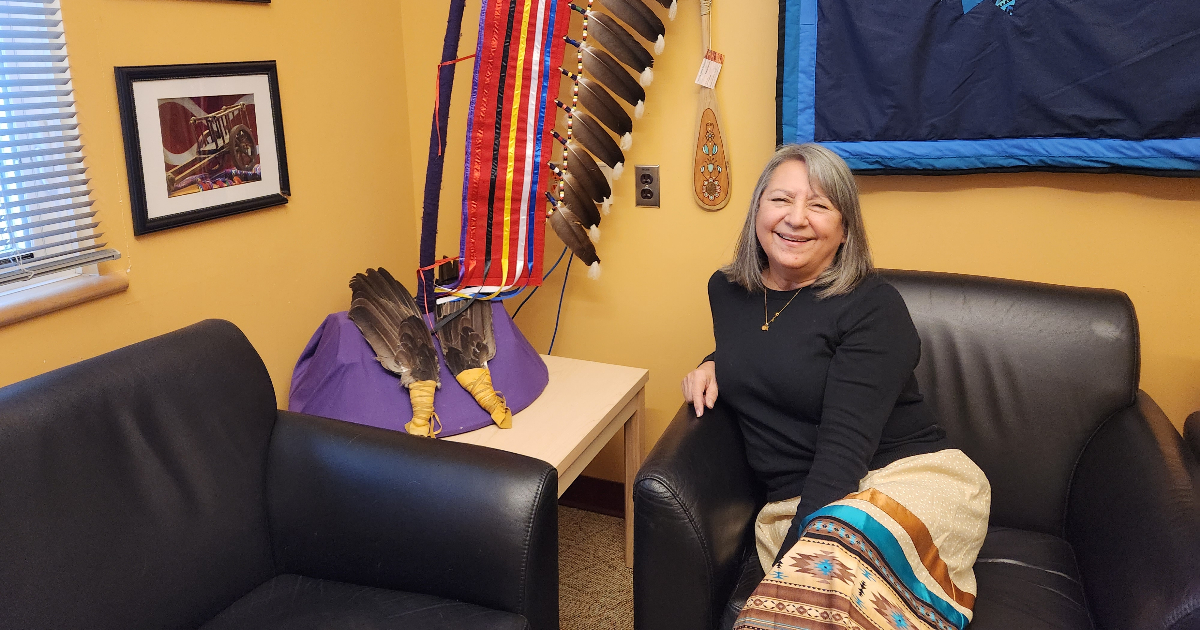
Kimberly Guimond joins the Indigenous Student Centre as a new Knowledge Keeper
Get to know ISC’s new Knowledge Keeper
Kimberly Guimond joins the Indigenous Student Centre as a Knowledge Keeper
The Indigenous Student Centre is excited to welcome Knowledge Keeper Kimberly Guimond, alongside Elders-In-Residence Norman Meade and Carl Stone, to the University of Manitoba community.
Kim comes to the university with a robust background, having graduated from UM in 2000 with a degree in Education. Upon graduation, Kim returned to her home community in Sagkeeng to teach middle years students for 17 years.
In 2018, Kim had the opportunity to join the Ojibwe Bilingual Program at Seven Oaks School Division – a program that was the first of its kind in Winnipeg. UM Today sat down with Kim to chat about her background and what brought her to the UM, today.
UM Today: Tell us a bit about yourself.
“Aaniin Boozhoo, I am a proud Anishinaabe from Sagkeeng First Nation. Today my husband and I reside at Lester Beach, Manitoba. We share three children, 16 grandchildren and ten great grandchildren. Our children live in Winnipeg, but Sagkeeng is always home. My mother Theresa Fontaine {Bruyere} gave me life but I was raised by my grandparents William and Angela Bruyere. My grandparents were very active in the community. My mother was a schoolteacher in Sagkeeng for over 30 years. She taught the Anishinaabe language for many years. I had great role models in my life, they inspired me to be who I am today.”
UM Today: What was your experience with post-secondary education?
“UM had a campus in Sagkeeng – it was the first of its kind – and my husband encouraged me to apply. My first thought was ‘yeah right, me?’ but my husband kept encouraging me and so I did, and I got into STEP – the Sagkeeng Teachers Education Program. It took a while to adapt to being a student. I felt like giving up a few times, but deep down I always wanted to be the teacher who made a difference in a child’s life.”
UM Today: How did you play a role in the Ojibwe Bilingual Program at Riverbend Community School?
“My role at Riverbend School with the Ojibwe Bilingual Program was to teach the language and culture along with academics. The program started with four Anishinaabe teachers, all from different communities. With our knowledge of language and culture, we shared different ideas and resources to make our classrooms inviting to learn. We created our own curriculum following the seasons, and used the double vowel system – a structured system that uses short and long vowels. Short vowels are formed using one letter and long vowels are formed using two letters. Following a structured system made a big difference, it was much easier to instruct and comprehend. Students grasped the concept quite quickly, learning to speak, read and write.”
UM Today: What has been your experience in learning traditional knowledge?
“I feel very fortunate to be able to speak my language and understand who I am as Anishinaabe and share that knowledge. The Seven Teachings guide me to what I need to focus on myself and share knowledge and my experiences with others.”
UM Today: How has your journey brought you to this position today at UM?
“I strongly believe I’m working here because my spirit guided me. People walk in your path for a reason. I’m answering the call. I am very fortunate and blessed to be able to work here and share my experiences and traditional knowledge.”
A final message from Kim on advice for Indigenous students:
“Be proud of who you are, I think that’s a very strong message. Having pride, you gain confidence and when you have confidence you can achieve anything. Whenever you feel stressed and feel like giving up, utilize the support that is offered here from Elders and Knowledge Keepers.”
Kimberly Guimond is available for support Wednesday to Friday from 8:30 a.m.- 4:30 p.m. and occasional Tuesdays. You can schedule an appointment with her by emailing isc@umanitoba.ca or by calling the Indigenous Student Centre at 204-474-8850.






